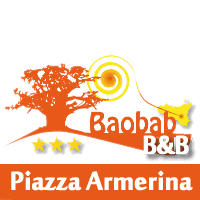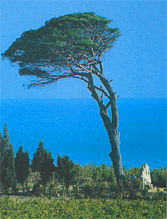Home - In and around
BIRTHPLACE LUIGI PIRANDELLO, AGRIGENTO
Birthplace Luigi Pirandello, Agrigento
Casa natale Pirandello
The museum is situated in Contrada Caos, 4 km from Agrigento. To reach it follow the main road SS115 to Porto Empedocle.
The native house is a farmhouse built at the end of the 18th c. in the countryside area called "Caos", close to Agrigento, a plateau sheer to the sea, spotted with olive trees and oaks.
The Ricci Gramittos, ancestors on the writer's mother's side, acquired the Villa in 1817.
Here the Pirandellos moved to escape the strong cholera epidemic which raged all Sicily in 1867.
In 1944 it was damaged by the explosion of the close American military warehouse and in 1949 was declared a national monument.
Three years later it was bought by the Sicilian Region who started the restoration works, reorganized the birthplace and made the path to Pirandello's pine.
The rooms which look over the countryside, hold a large photo collection, reviews and honours, first book editions with autographed dedications, important paintings dedicated to Luigi Pirandello, playbills of his most famous works performed in theatres all over the world. Periodically the museum houses temporary exhibitions on the museum itself.
Since 1987 the museum has been a whole with Luigi Pirandello's Library.
The walk to the "pine". Walking along a path in the countryside close to the museum, you arrive at a very old pine tree. Beneath this huge tree, Pirandello used to sit and think, paint, relax and write to his friends. According to his last will, fulfilled with the cerimony of the transfer of his ashes (10 December 1961), he was buried here. It is a very simple grave. A memorial stone, picked in the Rupe Atenea and slightly carved by the sculptor Marino Mazzacurati, houses the Master's cinerary urn, among wild flowers and agaves. "… take my cinerary urn to Sicily and place it into a stone in Girgenti countryside, where I was born".
Luigi Pirandello Library is a multimedial centre on the Sicilian dramatist which keeps and offers a wide variety of works divided in monographies, rare and precious materials, periodicals. Very important are the autographed documents, often owned by Pirandello's heirs: about 5000 documents, many of them still unpublished, such as letters, handwritten and typed theatre scripts, fragments, press cuttings and many personal mementos, such as the Fascist membership card dated 1936, the Italian Royal Academy membership card, the Bonn university membership card dated 1889, the Bonn and Coazze notebooks.
Luigi Pirandello Library
via Regione Siciliana 120 Agrigento
tel. 0922/444111 fax 0922/602299
Open Monday-Saturday 8am-2pm
Attic crater which contained Luigi Pirandello's ashes during the transfer in 1961
Luigi Pirandello is one of the most representative writers of literature in this century. Thanks to his works, the Italian literature of the first years of the 20th c. goes beyond the narrow borders of Italian culture and gets a world wide dimension, as it is confirmed by the Nobel prize won in 1934. In his works Pirandello describes the society in his times, at the turn of the century. What he is very interested in, is the strong malaise of lower middle class, victim of the alienating conditions of society, hypocrisy, egoism, prejudice and deceptions which people do and receive back. The main character of his works is never a "whole" man, linked to objective and universal values, but he is a man "fragmented" in his elements, alone and different from other people and from his Ego even, who is not able to identify himself with a specific personality: then he is "one, noboby and a hundred people".
(Fonte sito regionale beni culturali)
Casa natale Pirandello
The museum is situated in Contrada Caos, 4 km from Agrigento. To reach it follow the main road SS115 to Porto Empedocle.
The native house is a farmhouse built at the end of the 18th c. in the countryside area called "Caos", close to Agrigento, a plateau sheer to the sea, spotted with olive trees and oaks.
The Ricci Gramittos, ancestors on the writer's mother's side, acquired the Villa in 1817.
Here the Pirandellos moved to escape the strong cholera epidemic which raged all Sicily in 1867.
In 1944 it was damaged by the explosion of the close American military warehouse and in 1949 was declared a national monument.
Three years later it was bought by the Sicilian Region who started the restoration works, reorganized the birthplace and made the path to Pirandello's pine.
The rooms which look over the countryside, hold a large photo collection, reviews and honours, first book editions with autographed dedications, important paintings dedicated to Luigi Pirandello, playbills of his most famous works performed in theatres all over the world. Periodically the museum houses temporary exhibitions on the museum itself.
Since 1987 the museum has been a whole with Luigi Pirandello's Library.
The walk to the "pine". Walking along a path in the countryside close to the museum, you arrive at a very old pine tree. Beneath this huge tree, Pirandello used to sit and think, paint, relax and write to his friends. According to his last will, fulfilled with the cerimony of the transfer of his ashes (10 December 1961), he was buried here. It is a very simple grave. A memorial stone, picked in the Rupe Atenea and slightly carved by the sculptor Marino Mazzacurati, houses the Master's cinerary urn, among wild flowers and agaves. "… take my cinerary urn to Sicily and place it into a stone in Girgenti countryside, where I was born".
Luigi Pirandello Library is a multimedial centre on the Sicilian dramatist which keeps and offers a wide variety of works divided in monographies, rare and precious materials, periodicals. Very important are the autographed documents, often owned by Pirandello's heirs: about 5000 documents, many of them still unpublished, such as letters, handwritten and typed theatre scripts, fragments, press cuttings and many personal mementos, such as the Fascist membership card dated 1936, the Italian Royal Academy membership card, the Bonn university membership card dated 1889, the Bonn and Coazze notebooks.
Luigi Pirandello Library
via Regione Siciliana 120 Agrigento
tel. 0922/444111 fax 0922/602299
Open Monday-Saturday 8am-2pm
Attic crater which contained Luigi Pirandello's ashes during the transfer in 1961
Luigi Pirandello is one of the most representative writers of literature in this century. Thanks to his works, the Italian literature of the first years of the 20th c. goes beyond the narrow borders of Italian culture and gets a world wide dimension, as it is confirmed by the Nobel prize won in 1934. In his works Pirandello describes the society in his times, at the turn of the century. What he is very interested in, is the strong malaise of lower middle class, victim of the alienating conditions of society, hypocrisy, egoism, prejudice and deceptions which people do and receive back. The main character of his works is never a "whole" man, linked to objective and universal values, but he is a man "fragmented" in his elements, alone and different from other people and from his Ego even, who is not able to identify himself with a specific personality: then he is "one, noboby and a hundred people".
(Fonte sito regionale beni culturali)



